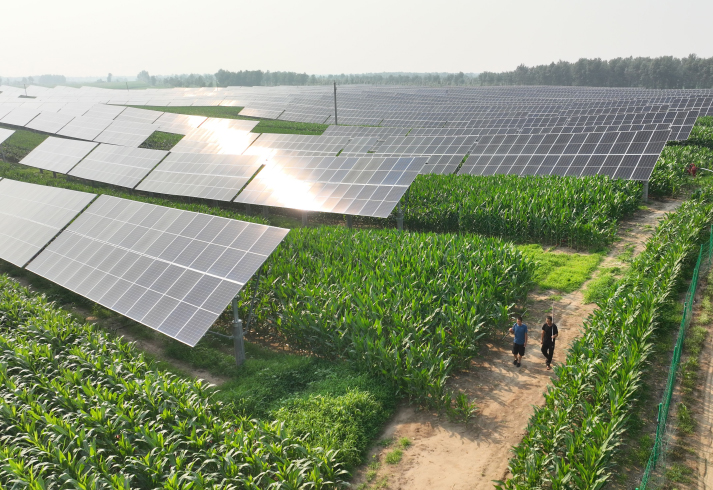| World |
| Officials and business leaders call for better global climate governance | |
|
|
 A passenger boards a China-manufactured electric bus in Cape Town, South Africa, on February 28 (XINHUA)
U.S. tech giant Apple Inc. continues to invest in China, the company's CEO Tim Cook said during the China Development Forum (CDF) in Beijing on March 24. Cook also noted how Chinese suppliers have contributed to the iPhone maker's carbon-neutral goals, saying they've been innovating and figuring out new ways of doing things. "It's going beyond what we initially can solve," he said at a symposium on carbon neutrality and global climate governance. The CDF, hosted by the Development Research Center of the State Council, China's highest state administrative organ, took place on March 24-25. "If you want to go fast, go alone; if you want to go further, go together," Cook said while emphasizing the significant role of Chinese partners in reducing carbon emissions. Better governance Since the early 1990s when human society acknowledged the issue of climate change with the establishment of the United Nations Framework Convention on Climate Change in 1994, the world has reached a critical juncture. Many representatives from the economic, business and political sectors at the forum emphasized the urgent need for concrete climate action before it is too late. To revitalize the global economy, address the climate crisis and realize the UN 2030 Sustainable Development Agenda, which covers a wide range of issues—including poverty, inequality, climate change, sustainable development, peace and justice, the international community must work together to foster new drivers of green productivity and accelerate the transition to a green and low-carbon development model, Zhao Yingmin, Chinese Vice Minister of Ecology and Environment, said. Wen Shugang, Chairman of China Huaneng Group Co. Ltd., a major power company in the country, underlined the need to enhance the legal framework for addressing climate change. He pointed out that the rise of unilateralism and protectionism, as well as inconsistent climate policies, in some nations have undermined the credibility and impact of international climate governance efforts. Wen also called for more technological breakthroughs, saying according to the International Energy Agency, about half of the technologies needed to achieve net zero emissions globally by 2050 are not yet mature and in urgent need of innovation. His opinion was echoed by Noel Quinn, CEO of HSBC Group, one of the largest banking and financial services organizations in the world, who said opportunities arising from the development of new technologies must be seized. "Not in the least because around 35 percent of the emissions reduction for [a successful] net zero transition depends on technologies not yet developed to the scale needed," he said. The process of global green and low-carbon transition will inevitably see international competition in related technologies, industries, trade, finance and standards, China's Special Envoy for Climate Change Liu Zhenmin said, adding that only fair and healthy competition will be conducive to the long-term development of different countries' industries. Addressing climate change requires global ambition, cooperation and, more importantly, the right implementation approaches, Zhao said. "Any attempts such as 'decoupling,' cutting off industrial and supply chains and adding trade barriers will only bring additional emissions, hinder the international community's efforts to address climate change, and run counter to global climate governance goals," Zhao said. Take the example of supply chains. These chains are interconnected and disruptions can lead to inefficiencies, increased energy usage and transportation emissions as companies search for alternative sources or routes. "If Western nations 'decouple' from China's clean energy products, the cost of renewable energy around the world may surge by 20 percent," Liu said, citing a new related analysis published by energy consultancy Wood Mackenzie in February.  Solar photovoltaic power generation equipment in Zhangwu County, Liaoning Province, on July 11, 2023 (XINHUA)
Joint efforts The World Meteorological Organization in its final State of the Global Climate 2023 report, released on March 19, confirmed that last year was the hottest on record by a clear margin. But the latest renewable energy transition data offers some hope, according to the report. The amount of renewable capacity added in 2023 was almost 50 percent greater than in 2022—bringing it to the highest rate observed in the past two decades, it read. According to the government work report approved at the annual national legislative session in early March, China's installed renewable energy capacity surpassed its thermal power capacity for the first time last year, and the country accounted for over half of the newly installed renewable energy capacity worldwide. Meanwhile, as one of the government's major tasks for this year, the country will continue to enhance ecological conservation and promote green and low-carbon development. "We need to realize that, compared with 10 or 20 years ago, tackling climate change and achieving carbon neutrality is no longer just a matter of empty talk, but has already involved a lot of human, material and financial resources, including tens of thousands of research and development (R&D) undertakings and industrial investment," Liu Shijin, chief advisor of the China Council for International Cooperation on Environment and Development and former Vice President of the Development Research Center of the State Council, said. He added that although the global efforts in carbon reduction have encountered challenges, countries should not waver in their goals of achieving carbon neutrality. "Otherwise, we will face great risks concerning the large amount of R&D and industrial investment," he said. The 28th Session of the Conference of the Parties to the United Nations Framework Convention on Climate Change last year in Dubai, the United Arab Emirates, called on countries to cooperate on agriculture, food and climate action—as a 2021 UN-backed study confirmed that more than one third of global greenhouse gas emissions caused by human activity can be attributed to the way people produce, process and package food. Business leaders at the CDF, such as CEO of Bayer AG Bill Anderson and CEO of Chinese dairy giant Yili Group Zhang Jianqiu, shared their explorations on reducing agricultural emissions. Anderson stated that whereas the agriculture and food processing industry is a significant source of greenhouse gases, it also plays a big role in offering solutions to address climate change. "Using innovative sustainable agricultural technologies, we can contribute to carbon neutrality and the fight against climate change," he added. Opportunities "China's leading advancements in solar and wind power, grid expansion and electric vehicles are driving increased demand for Rio Tinto's products, particularly copper, aluminum, and battery materials. The green transition is a whole new business opportunity for us," said Jakob Stausholm, CEO of Rio Tinto, the world's largest iron ore producer. According to data from the China Association of Automobile Manufacturers released in January, China's new-energy vehicle (NEV) production reached 9.587 million units in 2023, up 35.8 percent year on year. In China NEVs refer to vehicles completely or mainly driven by new-energy sources, including battery electric vehicles, plug-in hybrid electric vehicles and fuel cell vehicles. As a global leader, China has developed a source of world-class NEV exports, while simultaneously helping the country along its journey to meet its climate commitments, Quinn said. "China is not only the largest market for NEVs, but also an innovation hub with industry-leading companies and a mature NEV supply chain. We believe the Chinese market will continue to grow and play a leading role in bringing new innovations to our industry," Ola Källenius, Chairman of the Board of Management of Mercedes-Benz, Germany's leading luxury automaker, said. (Print Edition Title: Toward a Greener Tomorrow) Copyedited by Elsbeth van Paridon Comments to mamm@cicgamericas.com |
|
||||||||||||||||||||||||||||
|
